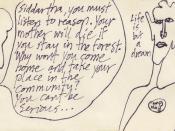I am reviewing Siddhartha written by Hermann Hesse. In this paper I will try to break down this book with different philosophies. That means this paper is going to be a mess of different world views, cultures, all in the context of my understanding of life. IÃÂll be looking at the moral dilemmas of the characters in the book, bringing in perspectives from Hedonism, Existentialism, Utilitarianism, and concluding with a cross examination of philosophies on an individual character of the book.
The general ethical and moral issues within the text are SiddharthaÃÂs search happiness, lack of life experience, a superiority complex, self-gratification and pleasure, and finding answers to his big questions. His search for happiness comes in the form of being discontent with life. Initially he questions the hand-me-down faith taught to him by his family, and wonders if the sacrifices prescribed in the religious teachings can really bring happiness and peace within him.
His lack of life experience and reluctance to accept the dogma of the religious people in his town are ultimately the fuel which compels him to leave his family and home to seek answers for himself. His upbringing shapes the way he views the world, and his ÃÂknow-it-allÃÂ approach to life even leads him to argue with the Buddha about the logic of his teachings. His carelessness to the ways of the world end up cornering him, and the superiority he felt over others catches up to him. He quickly learns about sensuality, the temptation of success and riches, the heart ache in raising his own son, total surrender, and finally Nirvana.
Hedonism is a great concept to compare and contrast to the life and religion of Siddhartha. The idea of self-gratification and experiencing pleasure is a significant part of his lifeÃÂs journey. Self-gratification...


